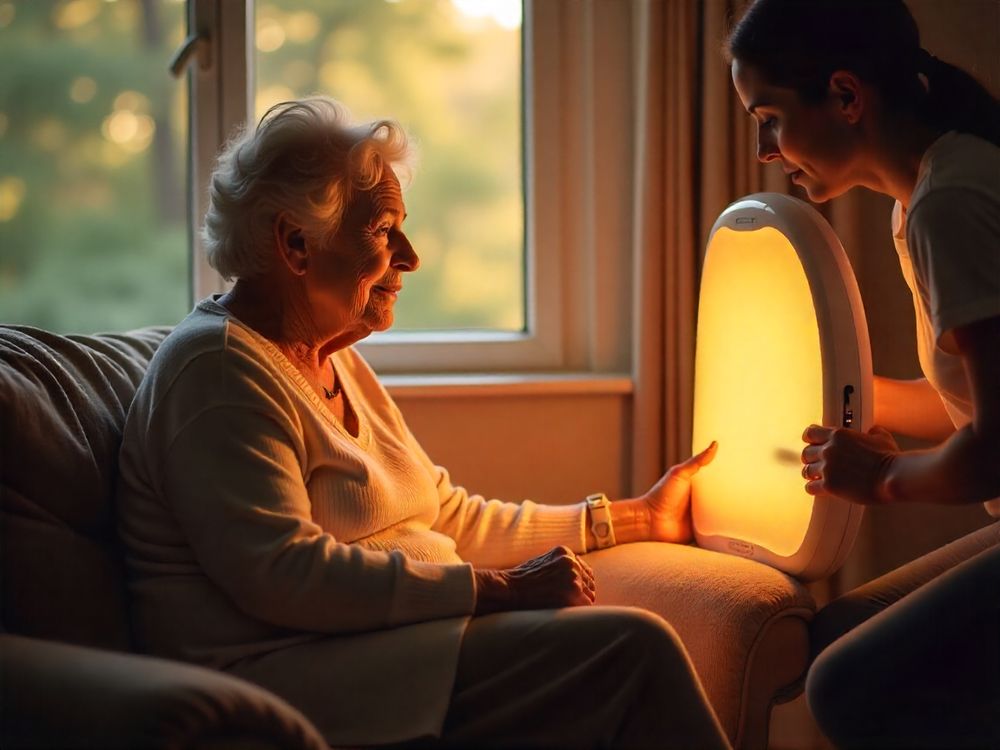Light Therapy: A Promising Aid for Alzheimer’s Patients
Marco Aurélio Gomes Veado
3 min read
•
September 4, 2025
Alzheimer’s disease is one of the most challenging neurodegenerative disorders, affecting millions of people worldwide. It not only impacts patients but also deeply affects their families and caregivers. While there is currently no cure, innovative therapies are emerging that may help improve quality of life. One such promising approach is light therapy.
This therapy, also known as photobiomodulation or bright light therapy, uses targeted light wavelengths to stimulate brain function, regulate circadian rhythms, and potentially slow cognitive decline.

How Light Therapy Works
Our brains are influenced by light more than we realize. Light helps regulate circadian rhythms, a natural internal clock that governs our sleep-wake cycle, hormone production, and mood regulation. In Alzheimer’s patients, circadian rhythms often become disrupted, leading to sleep disturbances, agitation in the evening (known as sundowning), and increased confusion.
Light therapy typically involves exposing patients to a specific intensity of light, often bright, full-spectrum light, at certain times of the day. This exposure can help reset the body’s biological clock, improve sleep quality, and stabilize mood.
Additionally, some experimental approaches focus on near-infrared light or gamma light stimulation (at 40 Hz), which have shown potential in animal studies to reduce toxic amyloid plaques and improve brain connectivity. While more research is needed, these findings are encouraging.
Key Benefits of Light Therapy for Alzheimer’s Patients
- Better Sleep Patterns
By resetting circadian rhythms, light therapy can help reduce nighttime restlessness and daytime fatigue. Improved sleep has a direct positive effect on mood, memory, and daily functioning. - Reduced Agitation and Sundowning
Alzheimer’s patients often experience increased confusion and irritability in the late afternoon and evening. Light exposure earlier in the day may help prevent these symptoms by stabilizing internal biological rhythms. - Improved Cognitive Function
Some studies suggest that light therapy may help boost attention, alertness, and short-term memory by enhancing brain activity and supporting neural health. - Non-Invasive and Low Risk
Compared to drug treatments, light therapy is safe, drug-free, and generally well-tolerated, making it an appealing complementary approach for caregivers to consider.
Scientific Evidence and Ongoing Research
Several clinical studies have explored the effects of light therapy on dementia symptoms. For example:
- Bright Light Exposure Studies: Trials have shown that regular exposure to bright light in the morning can improve sleep efficiency and reduce evening agitation in Alzheimer’s patients.
- Gamma Light Therapy Research: Experiments using 40 Hz flickering light in mice have demonstrated reduced amyloid plaque buildup and improved brain connectivity—findings that could pave the way for human trials.
While the results are promising, experts emphasize that more large-scale human studies are needed before light therapy can be considered a standard Alzheimer’s treatment.
Practical Tips for Caregivers
If you’re considering light therapy for a loved one with Alzheimer’s, here are a few guidelines:
- Consult a healthcare professional before starting any new therapy.
- Use approved light therapy devices designed for medical use.
- Schedule exposure in the morning or early afternoon to avoid interfering with nighttime sleep.
- Start with short sessions (20–30 minutes) and gradually increase duration as tolerated.
- Combine light therapy with other supportive approaches such as physical activity, a healthy diet, and social engagement.
Conclusion
Light therapy is still an evolving field, but its potential is undeniable. As research continues, this non-invasive, affordable approach could become a standard part of dementia care, helping patients maintain better sleep, mood stability, and possibly even cognitive resilience.
At MCI and Beyond, we believe in raising awareness of innovative and science-backed therapies that can improve the lives of those living with mild cognitive impairment and Alzheimer’s disease.
Share, follow us, and subscribe to our biweekly newsletter.
#LightTherapy #AlzheimersCare #MildCognitiveImpairment #DementiaSupport #BrainHealth #NeuroWellness #CaregiverTips #MemoryCare #CircadianRhythm #HealthyAging #MCIandBeyond
Sign up for our newsletter!
Get the latest information and inspirational stories for caregivers, delivered directly to your inbox.

